Custom Healthcare Software Development: Complete Guide
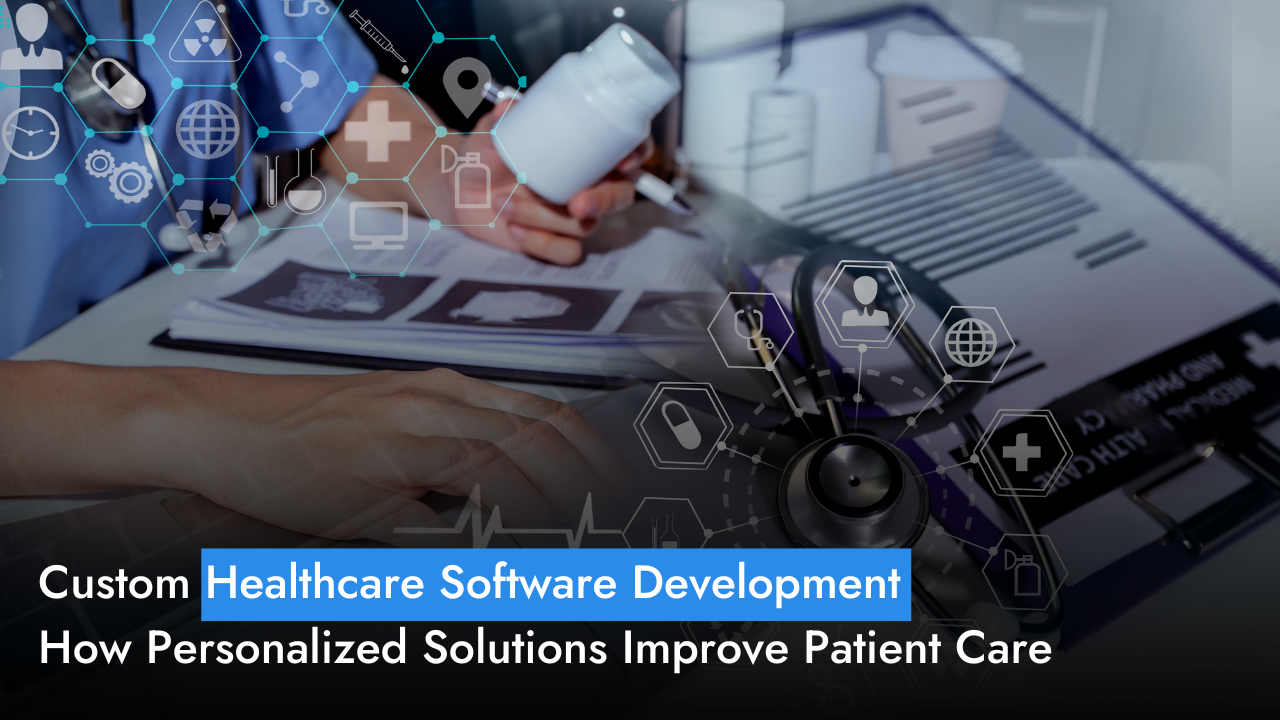
The healthcare industry is evolving rapidly, and custom healthcare software is at the heart of this transformation. But here’s the thing—while technology promises to improve care, many patients feel anxious about the growing dependence on digital systems. They worry about data security, impersonal care, and trust. This guide will dive deep into how custom healthcare software can alleviate those concerns while delivering real value to healthcare providers and patients alike.
Solving Your Biggest Healthcare Tech Challenges
- Are you concerned about patient data security in a world of rising cyber threats?
- Do you feel overwhelmed by the complexity of managing patient information across multiple platforms?
- Is your team losing valuable time due to inefficient healthcare systems?
- Do you worry that technology is taking the personal touch out of patient care?
Custom healthcare software addresses these concerns by offering HIPAA-compliant data security, seamless integration of platforms, and automated workflows that save time. Most importantly, it empowers you to focus on personalized care, ensuring that technology supports rather than replaces the human element in healthcare.
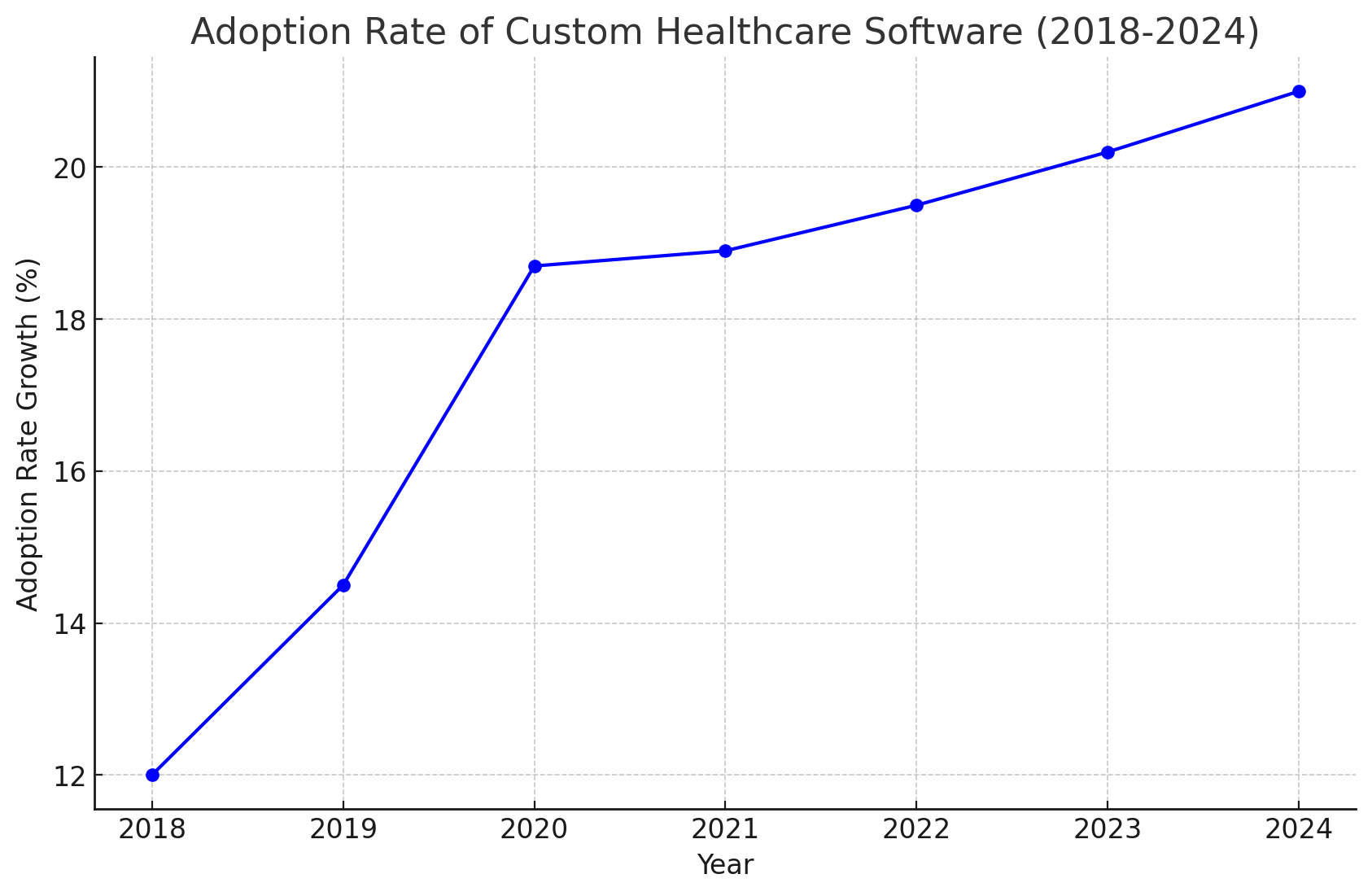
Why Custom Healthcare Software?
Think about the last time you visited a hospital. Did the doctor seem rushed? Did the administrative staff juggle paperwork while struggling to update your information in outdated systems? These inefficiencies affect patient trust. Patients worry their doctors won’t have access to complete, accurate records or may miss important updates.
- Custom healthcare software fixes this.
- It’s not just about automating processes; it’s about personalized solutions that fit the exact needs of a healthcare provider.
- When built correctly, these systems ensure that no detail gets overlooked, and care remains patient-centered.
For example, Imagine a mother bringing her child in for regular asthma check-ups. With a custom electronic health record (EHR) system, her child’s history—including medication changes, previous ER visits, and all specialist consultations—are visible to her pediatrician in real-time. This streamlines care and reduces the chance of misdiagnosis or improper treatment.
Tackling the Fear of Data Security (HIPAA Compliance)
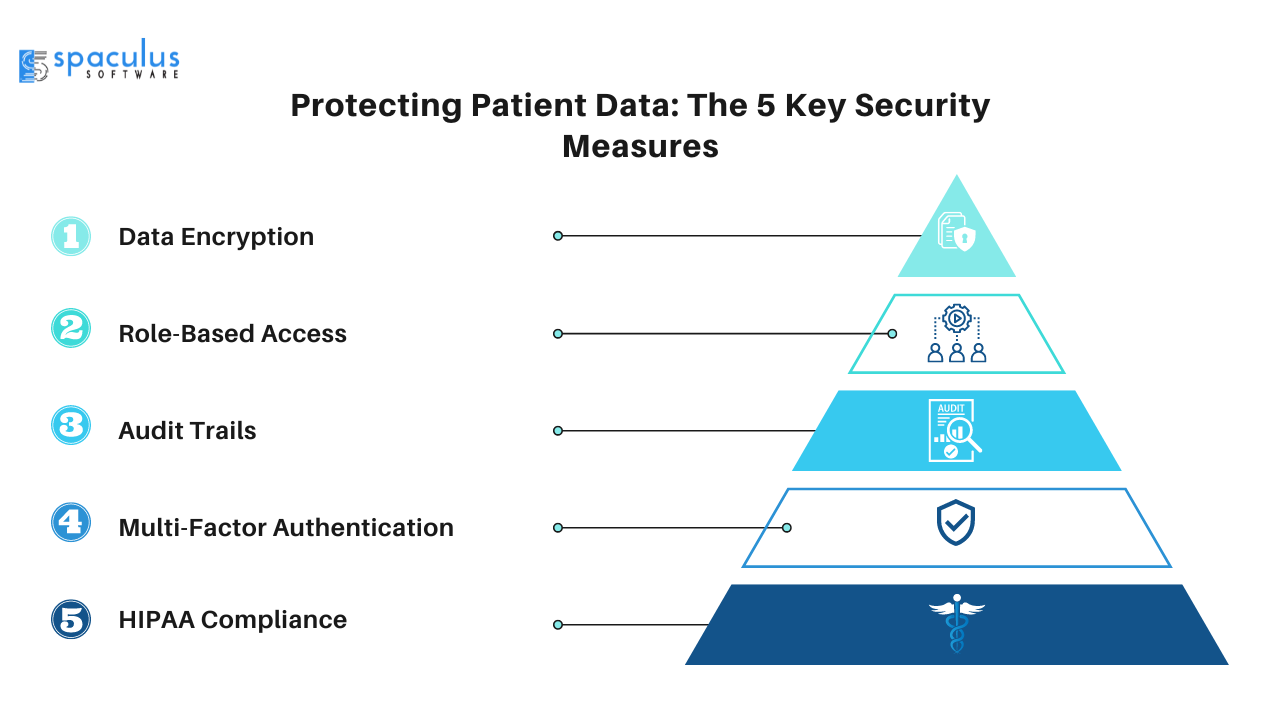
Before custom healthcare software solutions became widely used, patient data security was a significant concern. Many healthcare systems relied on paper records or basic digital systems that were vulnerable to breaches.
If patient files were misfiled, lost, or stolen, the damage was often irreversible, leading to identity theft, privacy violations, and legal challenges. Additionally, older software systems lacked the encryption and access controls needed to safeguard sensitive data, which heightened the fear of medical record breaches.
Custom healthcare software that is fully HIPAA-compliant has completely transformed the way healthcare providers protect patient data.
- Before, a hospital could have been storing patient data in unencrypted databases or using weak passwords that any unauthorized person could easily access.
- Now, custom-built software ensures that all patient data is encrypted, whether it’s stored on a server or being transmitted between doctors and specialists.
For example, a hospital using a custom EHR system will have role-based access control. This means that only the people who need to see specific information—such as the doctor, a specialist, or a nurse—have access to it.
If a cancer patient’s treatment plan needs to be shared with an oncologist and a radiologist, the system ensures that only those specialists can view the records. If a breach is attempted, audit trails record every attempt to access the data, allowing hospitals to monitor and respond to security risks quickly.
A large hospital previously experienced a cyberattack where hundreds of patient records were exposed because the data wasn’t encrypted. After switching to a custom HIPAA-compliant software, the hospital implemented encryption standards and multi-factor authentication, significantly reducing their vulnerability. Now, they can assure patients that their data is protected
d with the latest security protocols, giving peace of mind to everyone involved.
EMR & EHR Systems: Giving Patients Control
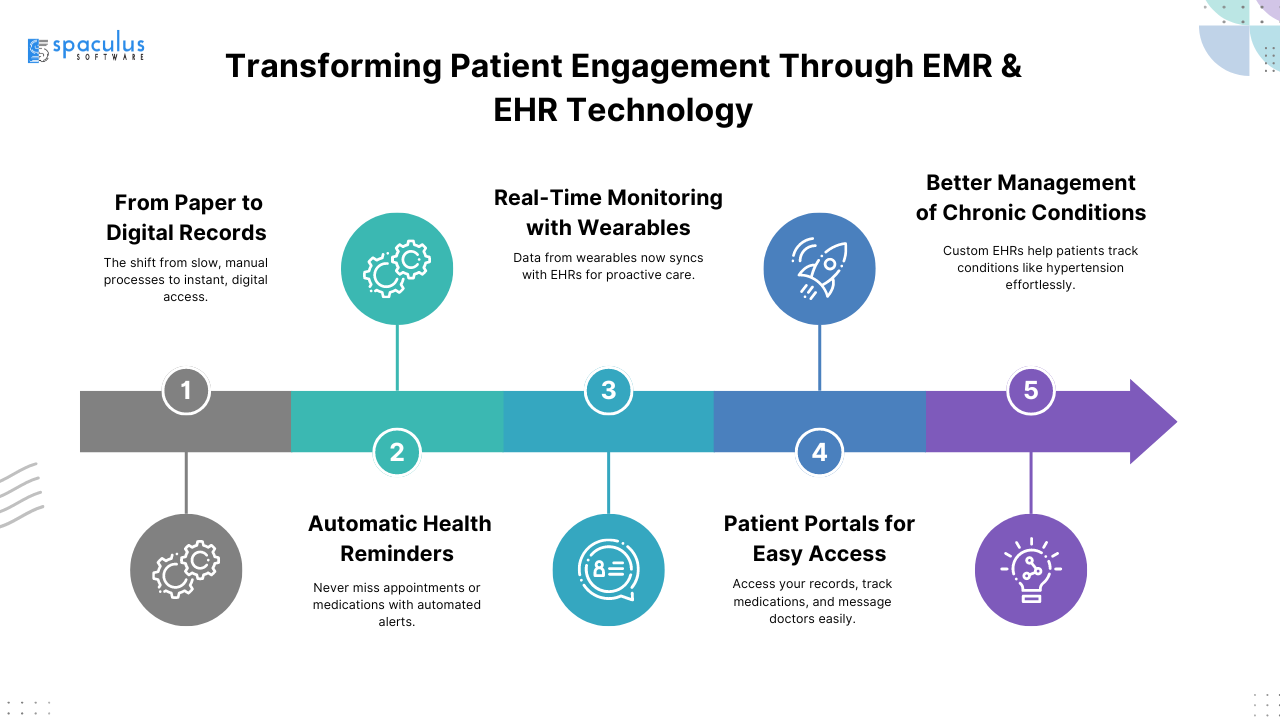
In the past, patients had very little control over their healthcare data. Before the widespread use of EMR (Electronic Medical Records) and EHR (Electronic Health Records) systems, patient records were mostly on paper, and accessing them was a tedious process.
If a patient needed to know their medical history or lab results, they’d often have to wait for a doctor’s office to mail or fax over the records. This created a disconnect between patients and their own health information, leaving them feeling powerless and uninformed.
Today, custom EMR and EHR systems have changed the way patients interact with their healthcare. With digital records, patients can now access their medical history, prescriptions, and lab results from their smartphones or computers.
- Before, they had to rely entirely on their doctors to remind them of follow-ups or medication refills.
- Now, custom systems can send automatic reminders for appointments, medications, and even when it’s time to get lab work done.
For instance, consider a patient with diabetes who needs regular blood glucose monitoring. In the past, the patient would visit their doctor periodically, who would assess their data manually.
Today, with custom EHR systems, the patient’s glucose readings from a wearable device are automatically uploaded to the EHR. The doctor can review this data in real time, adjusting medication dosages or recommending lifestyle changes without requiring the patient to visit the clinic.
For example, A patient managing a chronic condition like hypertension can now log into their personal patient portal, view blood pressure readings, and track how lifestyle changes or medications affect their health. If something is off, they can directly message their doctor and get real-time advice. This level of control wasn’t possible before.
Now, patients feel empowered, knowing they have direct access to their medical information and can engage in their healthcare on their own terms.
Telemedicine: Overcoming the Fear of Inaccessibility
For many patients, especially those living in rural areas or with limited mobility, accessing quality healthcare has always been a significant challenge. Before the advent of telemedicine, healthcare was largely tied to physical visits.
If you lived far from a city or specialist, you faced long drives, high travel costs, and possibly a delay in receiving necessary treatment. This lack of access often left patients feeling isolated and anxious about managing their health. The fear of not being able to see a doctor when it’s needed the most can be overwhelming.
Telemedicine: Overcoming Healthcare Access Challenges
For many healthcare professionals, providing access to care for patients in remote or underserved areas has been a long-standing issue. Patients who live far from medical centers or have mobility issues often struggle to get timely care. This can lead to missed appointments, delayed diagnoses, or worsening of conditions.
Limited Access to Care
Before telemedicine became widely used, patients had to travel long distances or wait weeks for appointments with specialists.
For example, a patient living in a rural area might need to drive hours just to consult with a specialist for a routine check-up. The cost and time of travel, combined with physical strain, often led to patients postponing or canceling appointments altogether, increasing the risk of complications in their health.
Now: Telemedicine Bridging the Gap
Telemedicine has transformed how patients and doctors connect. With virtual consultations, patients can now meet with their doctors through secure video calls without leaving their homes. This is especially beneficial for those with chronic conditions or limited mobility.
For example, a diabetic patient can have regular check-ins with their doctor, share their blood sugar levels via an app, and adjust their treatment—all without a physical visit. This instant connection to healthcare professionals reassures patients that help is always just a call away, regardless of location.
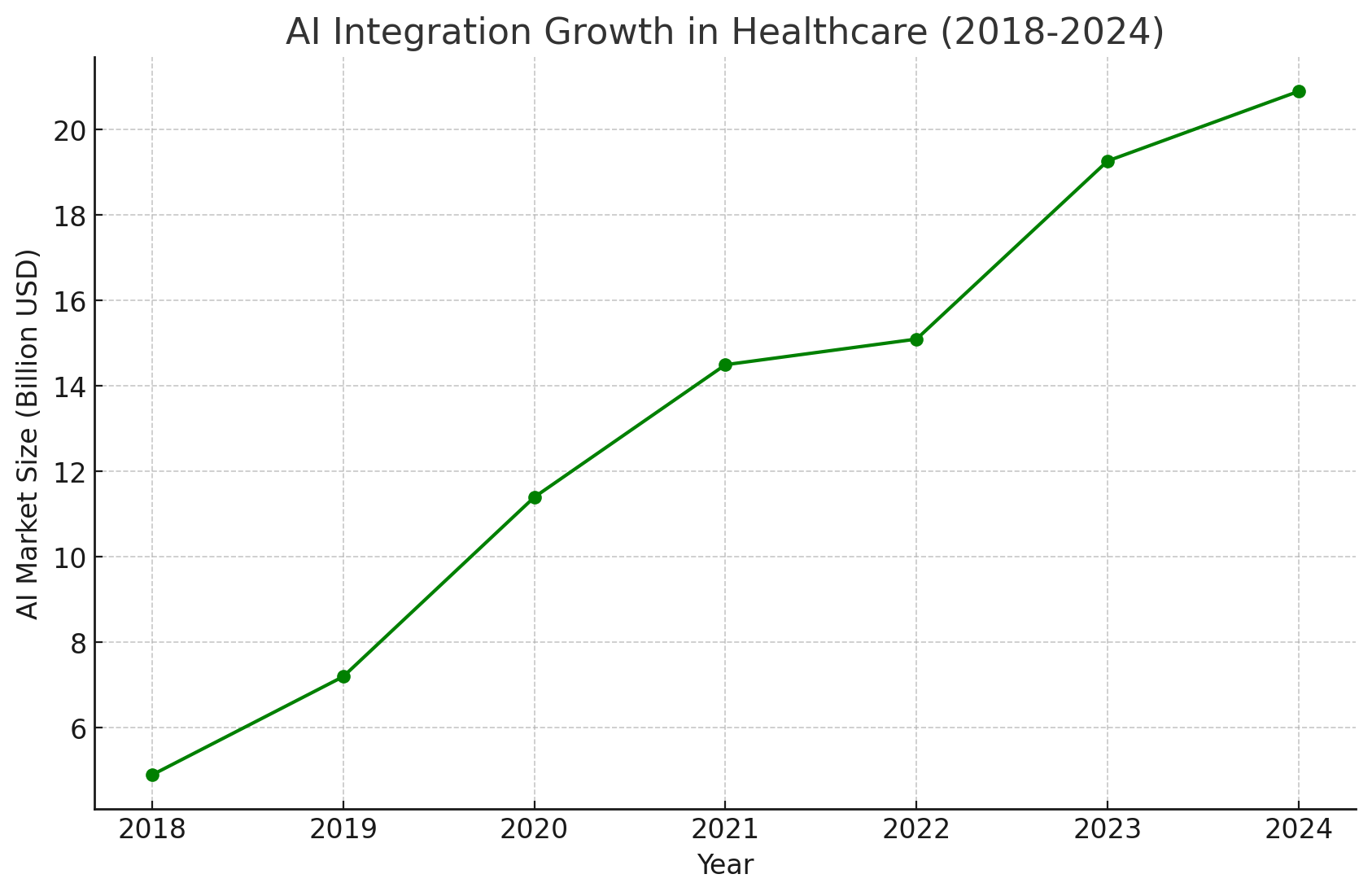
Healthcare Software is Scalable and Future-Proof
Another fear patients have is that technology will quickly become outdated, leading to poor service or medical errors. Custom healthcare software is scalable—it grows and adapts with new healthcare demands. Whether integrating AI for predictive diagnostics or expanding for more users, custom solutions remain flexible.
A small clinic using custom software for managing 100 patients today can seamlessly scale to 1,000 patients tomorrow, ensuring no slowdowns or loss of efficiency. The system could also incorporate AI to predict patient no-shows based on previous appointments, helping providers optimize scheduling and reduce lost time.
Easing Fears of Impersonal Care: Patient-Centered Features
One major anxiety patients feel is that healthcare is becoming more technical and less personal. But with custom solutions, this doesn’t have to be the case. Software can be designed to ensure patient interaction feels warm, supportive, and personalized.
A hospital might use a custom patient portal that greets patients by name, gives personalized health recommendations based on their conditions, and even offers chat support for quick questions. Instead of feeling like just another number, the patient feels cared for and valued.
What’s Next? The Future of Healthcare Software
As we move forward, custom healthcare software will increasingly integrate cutting-edge technologies like AI, blockchain for data security, and IoMT (Internet of Medical Things). These will provide even more personalized, secure, and efficient healthcare experiences for both patients and providers.
Imagine a world where your doctor knows about your health changes before you even step into the office. AI integrated with custom software can analyze data from wearables, medical tests, and even genetic profiles to predict health risks and recommend preventative actions.
In conclusion, custom healthcare software helps improve patient care by solving common problems like data security, inefficient systems, and the fear that technology may replace personal care. These systems are safe, follow privacy rules, and make daily tasks easier for healthcare workers. They also let patients access their health information quickly and have video appointments with doctors from home. Custom software ensures that doctors can give more personal attention to patients, using technology to support, not replace, the human side of healthcare.
Categories
- API Integration (4)
- App Development (38)
- Artificial Intelligence Insights and Trends (28)
- Business Analytics (14)
- Chatbot (3)
- Cloud Computing (5)
- Digital Marketing (10)
- eCommerce Insights and Trends (4)
- Explore Blogs on Technology and Innovation (9)
- IoT Insights and Latest Trends (8)
- Latest Updates (24)
- Live Streaming (2)
- Marketing Automation (3)
- RPA Insights and Applications (2)
- Tech World (27)
- Uncategorized (2)
- Web Design (17)
- Web Development (28)







